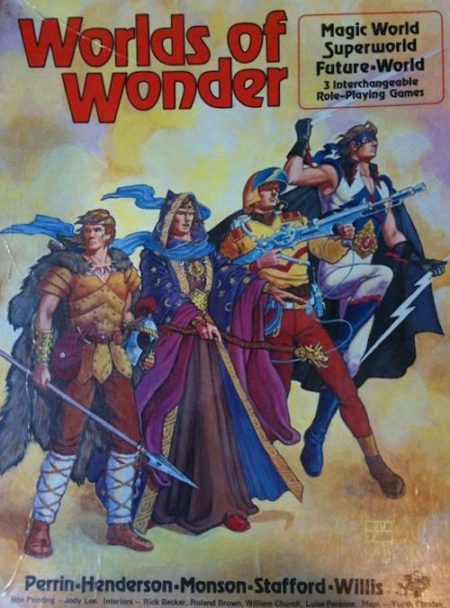Emmet Asher-Perrin’s worthy obit for Steve Perrin mentions such Perrin-related projects as Stormbringer, Call of Cthulhu, Thieves’ World, Elfquest, Robot Warriors, and (of course!) Superworld. One fascinating Perrin work that often goes unmentioned, probably due to the fact that it has become a comparatively obscure work, is 1982’s groundbreaking Worlds of Wonder. You may not have encountered it, but odds are that you’ve seen and played later games that it inspired or influenced.
The 9½ x 12 x 1 inch box for this game contained four 16-page booklets: Basic Role-Playing, Magic World, Superworld, and Future World. Assisting Steve Perrin were Steve Henderson, Gordon Monson, Greg Stafford, Lynn Willis and others. Roleplaying game design tends to be a team effort.
Basic Role-Playing (or BRP) was a setting-free distillation of the core game engine used in Runequest. Runequest 2nd edition (the one with hypno-boob cover art) was 120 pages long. This rulebook is just 16 pages; it’s a very lean presentation focusing on essentials. For those unfamiliar with the BRP family of games, BRP is skill-based and doesn’t use classes or levels. It focuses (for the most part) on human-level characters. Players more familiar with the robust characters provided by roleplaying games like D&D, Champions, or 13th Age will be surprised and delighted at the fragility of BRP characters!
Magic World expands on BRP. adding rules appropriate for a fantasy setting. This is where one discovers how magic (or at least one version of magic; Chaosium would offer many more versions in decades to come) works in BRP. As well, this book provides the stock elements (weapons and monsters) of standard faux-medieval-Europe fantasy settings.
Future World (or alternatively, Future-World) adds rules appropriate for a science fiction setting, one in which interstellar gates have given humans and other species access to the stars without the bothersome necessity of starships or star maps. When one has just 16 pages to explain settings and rules, one has to eschew inessentials. Characters are offered six career paths (paths reminiscent of Traveller’s). Characters may be human or non-human (perhaps one of the species unfortunate enough to have been subjugated by humans). An equipment list—not all of it weapons—is provided.
Finally, there is Superworld, which adapted BRP to the four-colored world of spandex-clad comic superheroes. Superworld was the exception to the rule that BRP characters are human level. A points-based system not unlike 1981 Champions provided the mechanism by which Superworld characters could be enhanced far beyond human limits.
Worlds of Wonder is the first time I encountered an attempt at setting forth that grail of roleplaying games, the universal roleplaying system. Given a robust core rule system, one need only provide setting-specific expansions, expansions that would let RPGers play in any genre they liked. They could even cobble together campaigns spanning several genres.
There may have been earlier attempts at universal roleplaying systems. I don’t know of any, but I’m sure that if there were some, I will find out all about them in the comments.
While quite lean by modern standards, Worlds of Wonder was entirely functional. I played the hell out of it, even going so far as to experiment with trans-genre campaigns. For various reasons the Worlds of Wonder model wasn’t followed by other WOW books for other genres. It was, however, the basis for many BRP-derived RPGs (including a free-standing game based on Superworld).
It may not have been a vastly lucrative venture, but it certainly proved that there was potential in universal systems. Plus, I had a lot of fun playing it, which is the main thing.
Although…perhaps it would be more accurate to say Worlds of Wonder was not followed up at the time. Chaosium’s recently announced Questworlds will feature its own line of Worlds of Wonder genre packs. I for one am quite eager to see them.
In the words of Wikipedia editor TexasAndroid, prolific book reviewer and perennial Darwin Award nominee James Davis Nicoll is of “questionable notability.” His work has appeared in Publishers Weekly and Romantic Times as well as on his own websites, James Nicoll Reviews and the Aurora finalist Young People Read Old SFF (where he is assisted by editor Karen Lofstrom and web person Adrienne L. Travis). He is a four-time finalist for the Best Fan Writer Hugo Award and is surprisingly flammable.










